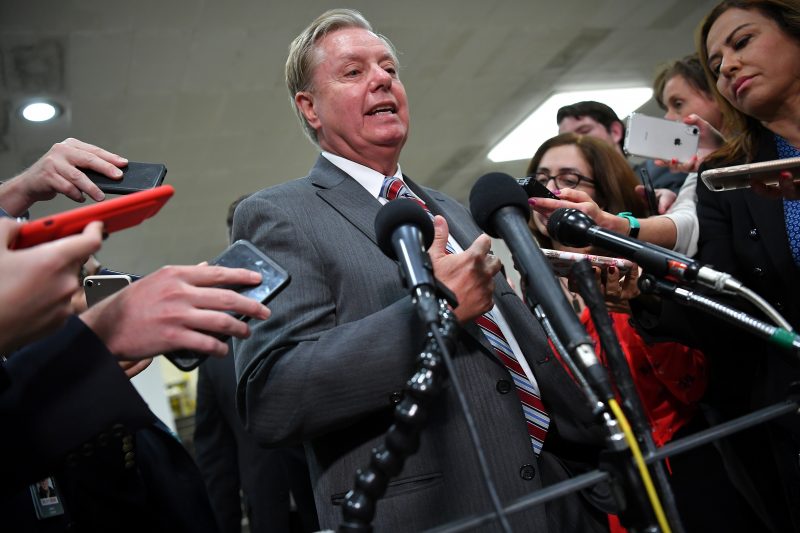Senators seek to block Trump’s arms sales to Saudis
US Senator Lindsey Graham, speaking to reporters after a closed-door briefing on Iran in May 2019, has broken with President Donald Trump on arms sales to Saudi Arabia (MANDEL NGAN)
Washington (AFP) – US senators across the political spectrum on Wednesday moved to block President Donald Trump’s plan to sell $8.1 billion in arms to Saudi Arabia and other Arab allies as lawmakers’ frustration with the kingdom soars.
The Trump administration last month said it would use emergency powers to defy Congress and provide $8.1 billion in munitions, aircraft maintenance and other military components to Saudi Arabia along with the United Arab Emirates.
The move infuriated lawmakers who believe the weapons could be used to kill civilians in war-ravaged Yemen, where the Saudis and Emiratis are mounting an offensive and millions are at risk of starvation.
Senator Lindsey Graham, a Republican who is usually in lockstep with Trump, voiced hope for “strong bipartisan support” in preventing the sales.
“While I understand that Saudi Arabia is a strategic ally, the behavior of Mohammed bin Salman cannot be ignored. Now is not the time to do business as usual with Saudi Arabia,” Graham said, referring to the kingdom’s powerful crown prince.
Secretary of State Mike Pompeo said the administration would not follow the usual process of submitting the sales to Congress due to an emergency caused by Iran, Saudi Arabia’s regional rival which has backed the Huthi rebels who control much of Yemen.
The senators nonetheless said they would go ahead and introduce resolutions of disapproval — as they could for sales that are formally submitted — for each of the 22 arms deals, which also include a transfer of US arms from the United Arab Emirates to Jordan.
The chances of success are uncertain as Trump could veto any disapproval resolutions, with the Senate and House of Representatives both needing two-thirds votes to override him.
– Khashoggi killing changes views –
Trump in April vetoed a resolution that would have ended US military support for the Saudi-led forces in Yemen.
Anger with Saudi Arabia has grown in Congress since the October killing of dissident writer Jamal Khashoggi, who wrote for The Washington Post and lived in Virginia.
He was strangled and his body dismembered after he entered the Saudi consulate in Istanbul to sort out marriage paperwork, according to Turkish and US officials.
Senator Chris Murphy, a Democrat who has been among the most outspoken critics of Saudi Arabia, said that only Congress could change the dynamics between the two countries.
“Selling more bombs to the Saudis simply means that the famine and cholera outbreak in Yemen will get worse, Iran will get stronger and al-Qaeda and ISIS will continue to flourish amidst the chaos of the civil war,” Murphy said.
“Saudi Arabia treats us like the junior partner in this relationship, chopping up US residents and torturing others, all the while demanding we remain silent and sell them more weapons,” he said.
– Nuclear concerns –
Lawmakers have also been outraged over the Trump administration’s eagerness to send nuclear technology and expertise to Saudi Arabia — again skirting the normal US process as Riyadh has not signed a so-called Section 123 agreement to guarantee peaceful use.
Senator Tim Kaine, who pressed the Energy Department for more detail on the transfers, said that two of the seven transfers took place after the slaying of Khashoggi — including one on October 18, 2018, just 16 days after he died.
“President Trump’s eagerness to give the Saudis anything they want, over bipartisan congressional objection, harms American national security interests and is one of many steps the administration is taking that is fueling a dangerous escalation of tension in the region,” Kaine said in a statement.
Saudi Arabia, the world’s top crude exporter, has launched an ambitious, $80 billion plan to build 16 nuclear reactors. But Crown Prince Mohammed has raised concerns by saying the kingdom would seek a nuclear weapon if Iran obtains one.
US lawmakers have been more divided on partisan lines over the high tensions with Iran, with Republicans backing Trump’s hawkish approach that includes a bid to stop all Iranian oil exports through sanctions.
Democratic lawmakers, while criticizing Iran, have said that the clerical regime has responded just as they expected to brash moves by Trump, including pulling out of an agreement under which Tehran drastically scaled back nuclear work.
Disclaimer: Validity of the above story is for 7 Days from original date of publishing. Source: AFP.


